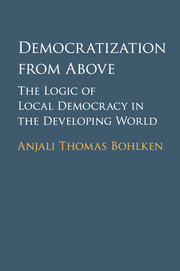Book contents
- Frontmatter
- Dedication
- Contents
- List of Figures
- List of Tables
- Acknowledgments
- 1 The Puzzle of “Democratization from Above”
- 2 The Strategic Logic of Local Democratization
- 3 Local Intermediaries, Local Democratization, and Political Party Organizations in India
- 4 “Constitutionalizing” Local Democracy: Explaining the 1993 National Constitutional Amendments
- 5 Intra-party Competition and Local Democracy in the Indian States: A Statistical Analysis
- 6 Intra-party Competition and Local Governance Reform in Kerala and Tamil Nadu
- 7 Local Politicians as Intermediaries: The Effect of Village-Level Politicians on State-Level Elections
- 8 The Logic of Local Democratization across the Developing World
- 9 Implications of “Democratization from Above”
- 10 Data Appendix: Dataset on Local Democratization Reforms in the Developing World
- Bibliography
- Index
1 - The Puzzle of “Democratization from Above”
Published online by Cambridge University Press: 18 December 2015
- Frontmatter
- Dedication
- Contents
- List of Figures
- List of Tables
- Acknowledgments
- 1 The Puzzle of “Democratization from Above”
- 2 The Strategic Logic of Local Democratization
- 3 Local Intermediaries, Local Democratization, and Political Party Organizations in India
- 4 “Constitutionalizing” Local Democracy: Explaining the 1993 National Constitutional Amendments
- 5 Intra-party Competition and Local Democracy in the Indian States: A Statistical Analysis
- 6 Intra-party Competition and Local Governance Reform in Kerala and Tamil Nadu
- 7 Local Politicians as Intermediaries: The Effect of Village-Level Politicians on State-Level Elections
- 8 The Logic of Local Democratization across the Developing World
- 9 Implications of “Democratization from Above”
- 10 Data Appendix: Dataset on Local Democratization Reforms in the Developing World
- Bibliography
- Index
Summary
Democracy has the potential to shape the lives of ordinary citizens in important ways. It can help citizens to exercise voice, to hold public officials accountable, and to protect themselves from the arbitrary use of power. In some democratic societies, these rights and privileges that citizens enjoy go all the way down to the grassroots, structuring political relationships at every level of government. However, in much of the developing world, democracy is uneven and shallow. Even if national democratic institutions exist, there is considerable variation in the degree to which democracy permeates down to local levels of government. In some societies, citizens have often been left to rely on unelected officials to address their most pressing local needs. In others, local democracy has been established and citizens have gained a new voice in shaping the local decisions that affect their lives. Curiously, however, rather than emerging organically from below, local democracy has typically been granted “from above” – established and fostered by the actions of government elites at higher levels. This book seeks to understand why and when local democracy emerges in this seemingly unlikely, yet all too common, way.
Some national governments have introduced significant reforms to strengthen democracy at the local level. In China in 1988, the national government significantly increased the political voice of the country's citizens by passing a law that instituted nationwide elections to village councils for the first time (O'Brien and Li 2000). In 1999 the Indonesian national government passed laws that significantly altered the country's political landscape below the national level by introducing elections for mayors and district heads and making these leaders accountable to their local legislatures (Silver 2003, p. 426). Yet there are also many government elites who have shown reluctance in establishing elected bodies at the local level. Some have even introduced measures to deliberately undermine the democratic functioning of local governments. For example, in Russia, President Putin decided to eliminate elections for regional governors and the mayors of several cities, who were then subsequently appointed by the Kremlin (Slider 2009). In Pakistan between 1993 and 1998, the national government altogether suspended local elected bodies, leaving citizens reliant on unelected local administrators to address their local needs (Cheema, Khwaja, and Qadir 2006).
- Type
- Chapter
- Information
- Democratization from AboveThe Logic of Local Democracy in the Developing World, pp. 1 - 24Publisher: Cambridge University PressPrint publication year: 2016
- 1
- Cited by



